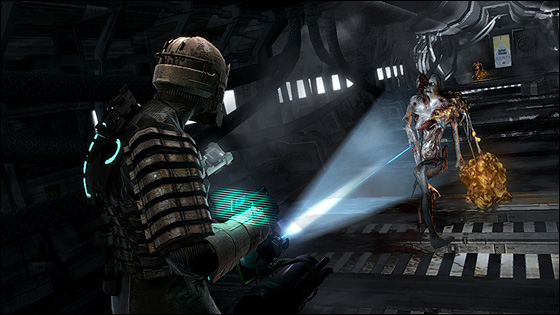The Role of Video Games in Chinese Youth Culture
September 30th, 2010
We’re all aware of the role video games have within a US and European cultures, but rarely do we know or hear very much about the importance of video games in other countries. In China, where I live, video games play a huge role in modern culture, particularly youth culture, and much of its effects I’ve noticed first-hand at the school I work. Video games are an outlet in a life otherwise full of great social pressure and hard work. In this regard video games take on a completely different form than what we may be comfortably use to.
In my school, we have an area with roughly 22 dedicated computers for students to use in their breaks or for parents who want to kill time while their child is in class. In a recent staff meeting, one of my colleagues complained about the negative influence the “computer lab” has over students. The teacher griped that many students would rush upstairs to play games on the computers during the 15 minute down time punctuating each hour of study and then subsequently loose track of time and arrive late to the second period. Obviously this is a real problem for our classes when students arrive 5 minutes to even half an hour late as they have done, and in fact regularly do, in some of my classes. (The half an hour example was, however, a once-off instance). Other teachers chimed in to the discussion, citing video games as a negative influence upon the children. The discussion moved away from the lab and into how every male student invariably uses the phrase “game over” instead of “die”, how video games seem to instil a violent tendency in some of the boys or how students could surprisingly reference a rich English vocabulary for firearms and weapons.
These are in fact real problems and as a teacher, they impede on my role as an educator. Never mind the irritation caused from comments like “teacher you’re game over”. However, video games, just like alcohol, film, junk food, pornography and literature are largely innocent on their own and further, it as not as though we can simply remove them from society. It is how society prevents possible issues that may arise from these things that is of larger importance. In which case, these issue is more of an indictment of China’s wider social problems as opposed to an intrinsic harm of the video game medium*.
*It should be noted that, equally, there are some issues on the other side of the fence too, regarding the design of maliciously addictive games.
In order to deal with the massive amount of children being educated in schools across China, the Chinese government employs heavy standardisation largely through the means of traditional examinations. Examinations play such an important role in Chinese education, culminating in what is called the gaokao 高考 (high test). The gaokao is the end-of-high-school/university-entrance examination sat around the nation every June. In the Chinese education system, your score in the gaokao represents your entire academic worth and ultimately acts to place you somewhere within China’s hierarchy of tertiary institutions. Get a good score in the gaokao and you may be accepted into one of the country’s better universities, giving you major advantage when lined up against the innumerable number of applicants gunning for the same job come 4 years times. Get a bad score and your prospects in life are all but shattered.
So obviously tests, and particularly the gaokao, are a big deal. Fail at the gaokao and your fate at the bottom of the ladder is partially sealed. Mass population and a system of standardisation built around examination and thereby ROTE learning are of great detriment to the development of critical and creative thinking, the arts as well as quality of life. And this is where video games come in.
In this world that I’ve just painted, escapism is a precious commodity. And in this modern world, nothing does escapism quite as well as video games (or the internet for that matter). With such an imbalance between work and pleasure, it’s no wonder my students are so memorised by video games. They desperately need an outlet and when they finally get it, the worth is invaluable. In this light, we can somewhat empathise with the reports we hear about Chinese people and video game/internet addiction.
The imbalances between work and relaxation are perfectly viewable from within the classroom. The majority of my students enter the class tired and exhausted. We have classes for kids that are 7-8 years-old which run until 9pm at night. With an open-minded foreign teacher replacing their unruly Chinese teacher, they treat our school like a social club, a reprieve from hard work. This is perhaps the reason why they’re so reluctant to knuckle down in our classes.
Another side of this social issue is the lack of moderation over what children play. If you thought the generation gap between you and your parents was a big deal, consider the changes that have occurred throughout China over the past 30 years. Parents of Chinese children today grew up in the decade Chairman Mao died, the Gang of Four were imprisoned and Deng Xiao Ping introduced sweeping economic reform. Thirty years later and their children are growing up in a world of mass population and accelerated capitalism on a scale the world has never seen where the rich are enormously wealthy and the poverty-stricken incredibly poor. The generation gap is massive and a significant part of that is the digital divide. Chinese parents, unlike their western counterparts, have had so little background experience with technology, that monitoring their children’s consumption habits of digital media is a challenge entirely new to them. When you have the combination of the parents unfamiliarity and the children’s almost religious like worship for video games, given that they can get access, the potential consequences for abuse are quite serious. Moderating children’s play time and actively engaging with a game together with a child is an important social responsibility threatened by the wide digital divide.
In our world, video games are a form of escapism from life’s troubles. In China, where the youth face enormous pressure in academic life due to overwhelming importance of the Gaokao and the immense amount of competition as a result of the large population, escapism is all the more precious and thereby so too are video games. Since video games are a means to escapism, they are often pinpointed as the reason behind social unrest. However, video games highlight the lack of reprieve from work in Chinese culture, bringing to light social issues such as the need for mediation between work and pleasure, the enormous digital divide and the phenomena of media addiction.
Visual Connection – Flipnote (DSi)
September 25th, 2010
I don’t have, nor do I intend on buying a DSi (I guess I’ll just wait for the 3DS and backwards functionality), but after reading the Iwata Asks interviews (here and here) on the free animation application Flipnote which comes with DSi units, I sure was super intrigued. For a basic overview you can watch a trailer here:
http://www.youtube.com/watch?v=i0jhPoMhHm0I believe that if you give people easy-to-use tools and a medium to publish then a lot of amazing things will happen. For Flipnote, the publishing medium is Flipnote Hatena and as you can see the animated shorts are largely impressive. I’ve handpicked a few favourite shorts from Youtube. More can be found at Flipnote Hatena, however, originally I used Youtube to find my videos, so I’ll just stick with that, please enjoy:
http://www.youtube.com/watch?v=jfoFq-3IdhE
http://www.youtube.com/watch?v=apB2enGTTOs
Comments on Dead Space
September 21st, 2010
Originally I bought Dead Space: Extraction because I’m a fan of on-rails shooters, and in this regard Extraction didn’t disappoint. Now, my brother already had bought the original Dead Space a few years ago, and although originally apprehensive to play it, I figured that if I rent the animated movie, Downfall, I could critique the franchise as a trans-media franchise (2 games, a comic and an animated movie) in succession to another article which you might hear about soon. Then I realised that Downfall was rubbish, mangled the continuity of the four “prequels” (there’s a new book, Martyr too) and in some cases broke it. In which case, it wouldn’t be worth the effort of picking up the pieces. (And when a supposed trans-media property breaks narrative, it’s obvious that the production is nothing more than a cash grab anyways). Finally, I played the original Dead Space, jotting down loads of notes as I went. After I completed the game, I did some research to see what others had written and then, alas, the nail in the coffin: Dan Whitehead’s review for Eurogamer.
Whitehead’s review invariably comments on every single criticism I’d scribbled down in the same OpenOffice document I’m writing in now, but, naturally, better written than anything I could muster. I love Eurogamer and their analytical and thoughtfully-worded reviews, but this one takes the crown as my favourite. Considering that everything I wanted to say has already been said, there’s little merit in me covering Dead Space, and since the continuity is such a mess I’ve given up on that too. There are a few comments that I’d like to add in my own words however:
The bogeyman confrontations in Dead Space are so rushed in order to catch you unaware that the 3rd person gameplay is lacking any dimension beyond the knee-jerk reaction. Due to this, there isn’t wide enough a window in the moments to drive in new and interesting permutations to the combat. Shortly after the player tires of the same jack-in-the-box combat (1/3 of the way through the game, for me personally), the pace just shuts down. Since too much of Dead Space hinges on this thin, shock ’em rock ’em style of over-the-shoulder shooting, the game forfeits itself to boredom very quickly. Furthermore, the puzzles, narrative, boss battles and set pieces are all too simplistic to act as a saving grace, let alone a relief.
This is particularly evident as the game Dead Space attempts to mimmic (ie. Resident Evil 4) managed to continually keep the player engaged in its over-the-shoulder combat for an extended play time. It’s all about nuance in enemy variety which challenges the player in new and interesting ways, something Dead Space‘s blend of horror has no room for.
The audio logs in the game try their best to shock you with their highly-produced screams and industrial noises, but it all just becomes offensive in the end since none of the horrors you face as a player are ever so menacing.
I do like the node upgrade system though since I managed to sell off most of my ammo and health and use the cash to buy nodes, lowering my munitions and playing the game as a real survival horror.
Having played Extraction though, I already knew how to dismember the majority of enemies which aided in me gaining so many power nodes and almost maxing out my gear.
On the other hand, the repetition caused by the limited variety of space monsters also made the process of saving ammo to sell off considerably easier.
How is it possible for flies to exist in space? *slaps forehead*
The Ripper really does allow the player to treat the bloody dismemberment almost like sculpturing which itself is oddly enjoyable. If you become seasoned enough with this weapon you can use fewer saw blades to slice up the aliens and ultimate save money for your wares. This sort of nuance makes it one of the better weapons in the game.
Watching the developer logs on Dead Space, I really disparage Visceral’s ethos for development.
There’s a lot of clever directional markers which work to decompress the densely detailed world for the player. The red and green neon signs, the signage, the PA voiceover, the way chapters follow a similar pacing structure, the lightening and the way points which can be projected onto the floor.
The graphic artists are obviously fans of the Visitor font.
Other readings









 Game Design Companion: A Critical Analysis of Wario Land 4 - $7.99
Game Design Companion: A Critical Analysis of Wario Land 4 - $7.99 Level Design: Processes and Experiences
Level Design: Processes and Experiences Speed Boost: The Hidden Secrets Behind Arcade Racing Design - $5.99
Speed Boost: The Hidden Secrets Behind Arcade Racing Design - $5.99 Adventures in Games Analysis: Volume I - $5.99
Adventures in Games Analysis: Volume I - $5.99







